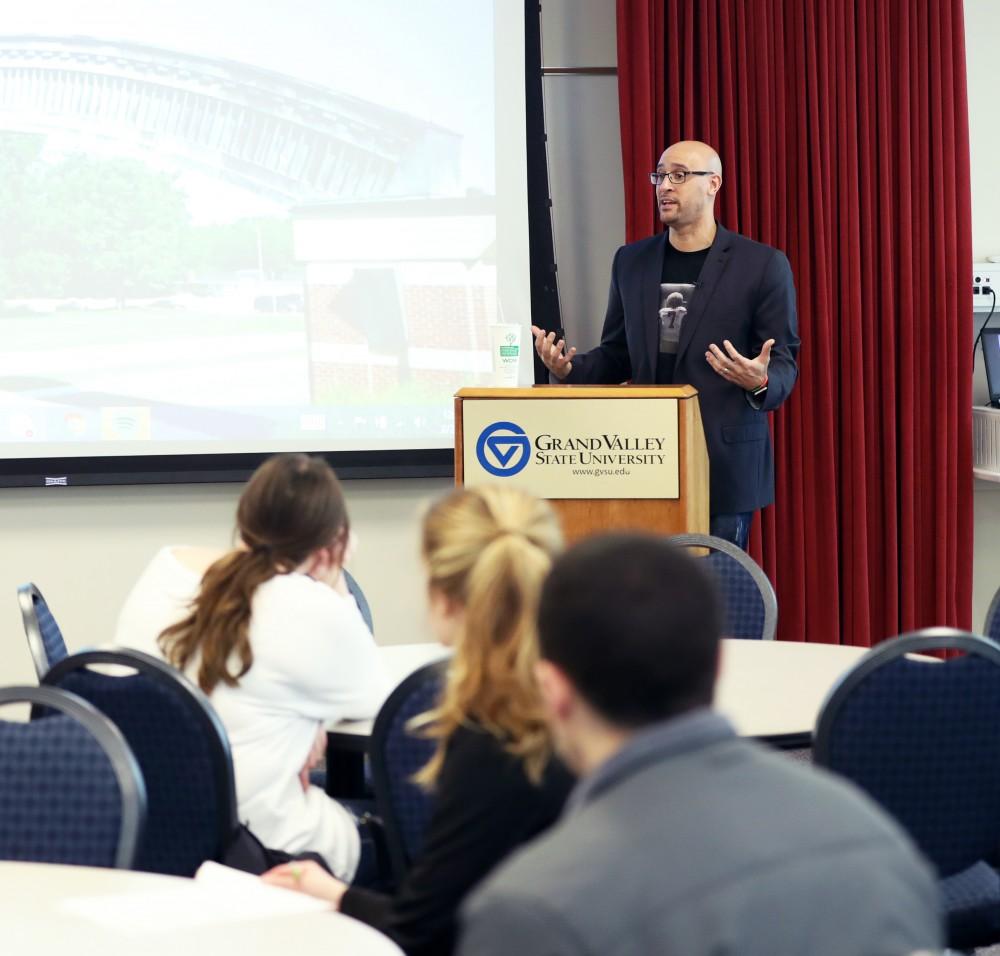‘Protest and love’

GVL/Kevin Sielaff – Professor Louis Moore speaks during the Democracy: 101 event on Wednesday, Feb. 22, 2017.
Feb 23, 2017
Since its inception, protests in the U.S. has not come in blips, but in waves.
From the revolution of 1776, to the call of abolitionism in the 1800s, to the widespread fight against the Vietnam War in the 1960s, protestors have fought at injustices in their cultures and lives since the beginning.
Present day protests have ranged from the Dakota Access Pipeline, to the Women’s March in Washington D.C. and the John F. Kennedy International Airport protest – which later spanned across the U.S. – against President Donald Trump’s executive order to detain refugees.
Capitalizing the nature of protests, Louis Moore, associate professor of history and coordinator of the African and African American Studies program at Grand Valley State University, spoke in GVSU’s Kirkhof Center, Wednesday, Feb. 22, as part of the Democracy 101 series highlighting why protests matter.
“They matter because they are designed to matter,” Moore said. “Protests draw attention to oppression.”
Beyond trying to make the past relevant in today’s public forum, Moore said at the Democracy 101: “Do Protests Matter?” session talking about past and present protests allows individuals to navigate the contemporary political landscape.
Melissa Baker-Boosamra, the associate director of student life, civic engagement and assessment at GVSU, said the significance of the event is to understand democracy and its effect on public issues.
“The purpose of Democracy 101 is to provide space and time for the Grand Valley community to think together about the fundamental democratic values, principles and structures that are really fundamental to our lives and to the democratic system,” she said.
Moore addressed the 25 participants in the Kirkhof Center Room 2270, and spoke about a need for some reassurance – especially with the last few weeks of massive protests in the U.S., he said – in saying protests do matter and do work.
Talking about the individuals behind the protests, Moore said protests are a means to an end.
“What I’m telling you today is that privilege don’t give up their privileges without strong resistance,” he said. “It has historically been the marginalized folks in American history that make meaning out of protest and make meaning out of democracy.”
“We started this nation off of slavery, we started this nation off of misogyny and we proceed to get worse before we proceed to get better and it is the marginalized folks that consistently pushed us in America.”
In order to achieve full rights, Moore said the weapons needed and used to create change by marginalized groups are protest and love.
“There are protests, but what we get out of the Civil Rights Movement is the blueprints of today and we get success,” he said.
Ella Fritzemeier, GVSU’s student senate president, asked Moore about successfully organizing a protest.
“There are a lot of different groups so how do you get everyone on the same page kind of thing when there are so many different perspectives,” she asked.
In response, Moore said it is about bringing people together.
“The key I think for organizing, which is almost like I tell my students,” he said, “is when it comes to doing group work in class or collaboration in class, university collaboration, is that everyone has to be accountable.”
“When it comes to group organizing, these grass roots have to be strong.”
For more information about the Democracy 101 events at GVSU, visit www.gvsu.edu/service/civic-learning-and-democratic-engagement-169.htm.






















